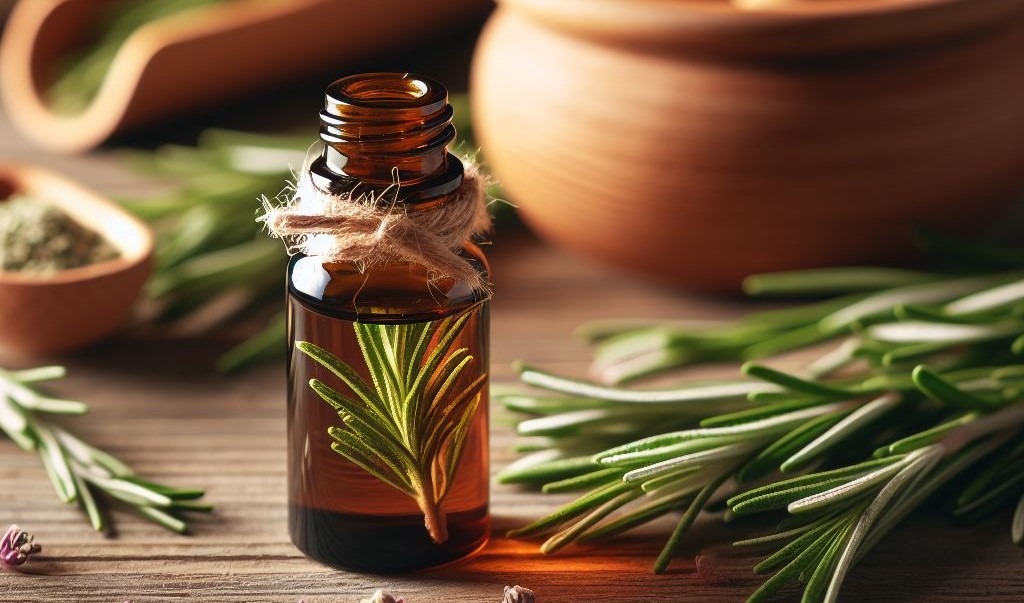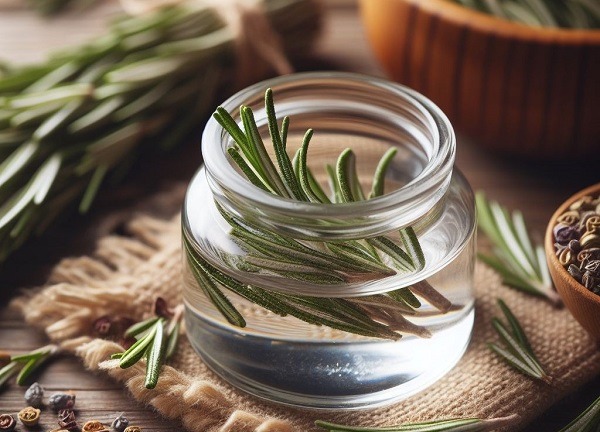Rosemary essential oil is like a little bottle of nature’s goodness, packed with the aromatic essence of the beloved herb. How to make rosemary essential oil? It is a very easy method and has many benefits. Let’s delve into the proper guide in which you can easily find solutions and methods.
Why Make Rosemary Essential Oil at Home?
Crafting your rosemary essential oil isn’t just about saving a few bucks (though that’s certainly a nice bonus). It’s about taking control of what goes into your products, ensuring purity, potency, and freshness every step of the way. Plus, there’s something undeniably satisfying about concocting your potions and elixirs, wouldn’t you agree?
The Versatility of Rosemary Essential Oil
One of the things that makes rosemary essential oil so darn appealing is its sheer versatility. Whether you’re looking to promote relaxation, support healthy hair and scalp, or simply infuse your home with a touch of natural fragrance, this powerhouse oil has got you covered.
5 Ways to Make Rosemary Oil
In this guide, we’ll explore five simple and effective methods for making rosemary oil at home.
1. Traditional Infusion Method
Let’s start with the classic method for making rosemary oil: infusion. This simple technique involves steeping fresh rosemary leaves in a carrier oil of your choice to extract their aromatic oils and beneficial compounds.
To make rosemary oil using the traditional infusion method, follow these steps:
- Gather fresh rosemary leaves and a carrier oil such as olive oil or almond oil.
- Place the rosemary leaves in a clean, dry glass jar and cover them with the carrier oil.
- Seal the jar tightly and let it sit in a warm, sunny spot for at least two weeks, shaking it gently every day to encourage infusion.
- After two weeks, strain the oil through a fine mesh sieve or cheesecloth to remove the rosemary leaves.
- Transfer the infused oil to a clean glass bottle for storage.
2. Cold Infusion Method
If you’re short on time or prefer a gentler extraction process, the cold infusion method may be more your speed. This method involves letting the rosemary leaves infuse in oil at room temperature over a longer period, resulting in a milder but still aromatic oil.
To make rosemary oil using the cold infusion method, follow these steps:
- Follow the same initial steps as the traditional infusion method, placing fresh rosemary leaves in a glass jar and covering them with carrier oil.
- Instead of letting the jar sit in a warm spot, place it in a cool, dark place away from direct sunlight.
- Allow the oil to infuse for at least four weeks, shaking the jar gently every few days to distribute the rosemary oils.
- After four weeks, strain the oil and transfer it to a clean glass bottle for storage.
3. Heat Infusion Method
For a quicker infusion process, you can use heat to speed up the extraction of the rosemary’s aromatic oils. This method is ideal for those who want to make rosemary oil in a shorter amount of time without sacrificing potency.
To make rosemary oil using the heat infusion method, follow these steps:
- Place the carrier oil and fresh rosemary leaves in a heat-safe container, such as a double boiler or a heat-resistant bowl set over a pot of simmering water.
- Heat the oil gently over low to medium heat for one to two hours, stirring occasionally to encourage infusion.
- Once the oil has taken on the scent and color of the rosemary, remove it from the heat and let it cool slightly.
- Strain the oil through a fine mesh sieve or cheesecloth to remove the rosemary leaves, then transfer it to a clean glass bottle for storage.
4. Solar Infusion Method
For those who prefer a hands-off approach to oil infusion, the solar infusion method is an excellent option. This method involves harnessing the power of the sun to gently infuse the oil with the aromatic oils of the rosemary leaves.
To make rosemary oil using the solar infusion method, follow these steps:
- Follow the initial steps of the traditional infusion method, placing fresh rosemary leaves in a glass jar and covering them with carrier oil.
- Seal the jar tightly and place it in a sunny spot outdoors, such as a windowsill or balcony.
- Allow the oil to infuse for several weeks, shaking the jar gently every few days to distribute the oils.
- After the desired infusion time has passed, strain the oil and transfer it to a clean glass bottle for storage.
5. Vinegar Infusion Method
Last but not least, the vinegar infusion method offers a quick and easy way to extract aromatic oils from rosemary leaves using everyday pantry staples. This method results in a fragrant and flavorful vinegar that can be used in cooking, cleaning, or as a hair rinse.
To make rosemary-infused vinegar, follow these steps:
- Fill a clean glass jar with fresh rosemary leaves and cover them with vinegar, such as apple cider vinegar or white wine vinegar.
- Seal the jar tightly and let it sit in a cool, dark place for at least two weeks, shaking it gently every day to encourage infusion.
- After two weeks, strain the vinegar through a fine mesh sieve or cheesecloth to remove the rosemary leaves.
- Transfer the infused vinegar to a clean glass bottle for storage.
Also read: How To Make Black Seed Oil for Health
7 Uses of Rosemary Essential Oil
In this guide, we’ll explore seven creative and effective ways to incorporate rosemary essential oil into your daily routine.
1. Aromatherapy:
One of the most popular uses of rosemary essential oil is in aromatherapy, where its invigorating scent can help uplift the spirits and promote mental clarity.
Simply add a few drops of rosemary oil to a diffuser and let the aromatic molecules fill the air, creating a refreshing and energizing atmosphere. Alternatively, you can inhale the scent directly from the bottle for a quick pick-me-up anytime, anywhere.
2. Scalp Treatment:
Rosemary essential oil is also renowned for its ability to promote a healthy scalp and stimulate hair growth.
Add a few drops of rosemary oil to your favorite carrier oil, such as coconut or jojoba oil, and massage it into your scalp before shampooing. Not only will this help nourish the scalp and hair follicles, but it will also leave your locks looking shiny and luscious.
3. Skincare:
Thanks to its antioxidant-rich properties, rosemary essential oil is a popular ingredient in skincare products aimed at promoting youthful, radiant skin.
Add a drop or two of rosemary oil to your daily moisturizer or facial serum to help protect against environmental stressors and promote a healthy glow. You can also create your DIY skincare treatments using rosemary oil as a key ingredient.
Also read: How To Make Garlic Oil For Ear Infection at Home
4. Muscle Relief:
If you’re dealing with sore muscles or joint pain, rosemary essential oil may offer some relief.
Mix a few drops of rosemary oil with a carrier oil like almond or olive oil, then massage it into the affected area using gentle, circular motions. The soothing properties of rosemary oil can help ease tension, reduce inflammation, and promote relaxation.
5. Respiratory Support:
Rosemary essential oil may help clear your airways and ease respiratory discomfort.
Add a few drops of rosemary oil to a bowl of hot water and inhale the steam, or create your homemade chest rub by mixing rosemary oil with carrier oil and applying it to your chest and throat. The refreshing scent of rosemary oil can help open up your airways and promote easier breathing.
6. Household Cleaning:
Say goodbye to harsh chemical cleaners and hello to the natural cleaning power of rosemary essential oil.
Add a few drops of rosemary oil to a spray bottle filled with water and use it to clean countertops, floors, and other surfaces around your home. Not only will your home smell fresh and fragrant, but you’ll also be reducing your exposure to potentially harmful chemicals.
7. Insect Repellent:
Last but not least, rosemary essential oil can also be used as a natural insect repellent to keep pesky bugs at bay.
Mix a few drops of rosemary oil with water and spray it onto your skin or clothing before heading outdoors. You can also add rosemary oil to homemade insect-repellent candles or diffusers to create a bug-free zone in your outdoor living spaces.
Also read: How To Make Oil From Oregano for Health
How to Make Rosemary Essential Oil for Hair Growth
Hair follicles are stimulated by rosemary essential oil, which encourages growth and decreases hair loss. Its antibacterial qualities help to keep the scalp healthy as well. Include in your hair care regimen for lustrous hair.
Gather Your Ingredients and Equipment
Before we dive headfirst into the wonderful world of DIY essential oil making, let’s take a moment to gather our supplies. Here’s what you’ll need:
- Fresh rosemary leaves: Aim for the freshest rosemary you can find, preferably harvested from your garden or sourced from a local farmer’s market.
- Carrier oil: Opt for a high-quality carrier oil like jojoba, almond, or olive oil. This will serve as the base for your rosemary essential oil.
- Distillation equipment: While you don’t need a fancy distillation setup, you will need some basic equipment to extract the essential oil from the rosemary leaves. A simple stovetop method using a pot and a heat-resistant bowl will suffice.
Prepare Your Work Area
Before we get started, it’s essential to set up a clean and organized workspace. Clear off your kitchen counters, gather your ingredients and equipment, and put on your metaphorical DIY hat. Don’t forget to tie your hair back.
Infuse the Rosemary
Now comes the fun part: infusing your carrier oil with the essence of rosemary. Here’s how to do it:
- Start by finely chopping your fresh rosemary leaves to release their aromatic oils.
- Place the chopped rosemary leaves in a heat-resistant bowl and cover them with your chosen carrier oil.
- Set up a makeshift double boiler by filling a pot with water and placing your bowl on top.
- Heat the water gently over low to medium heat, allowing the rosemary and carrier oil to infuse for several hours. The low heat will coax out the essential oils from the rosemary without scorching them.
Strain and Store
Once your rosemary-infused oil has had ample time to steep, it’s time to strain out the plant material and bottle up your precious elixir. Here’s how to do it:
- Carefully remove the bowl from the double boiler and let it cool slightly.
- Place a fine mesh strainer or cheesecloth over a clean glass jar and carefully pour the infused oil through it, catching any stray bits of rosemary.
- Press down on the rosemary leaves with the back of a spoon to extract as much oil as possible.
- Seal the jar tightly and store it in a cool, dark place to preserve its potency.
Also read: How to make Rosemary Tea









